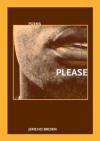Please
The epigraph from Prince Rogers Nelson (“The beautiful ones always smash the picture”) provides a succinct introduction to the territory Brown mines throughout Please; namely, the intersection of violence and desire. For those who may not recognize his full given name, Prince Rogers Nelson is better known simply as Prince (a.k.a. The Artist Formerly Known As…). It should come as no surprise, given the choice of epigraph, that music is one of the book’s central motifs.
The epigraph from Prince Rogers Nelson (“The beautiful ones always smash the picture”) provides a succinct introduction to the territory Brown mines throughout Please; namely, the intersection of violence and desire. For those who may not recognize his full given name, Prince Rogers Nelson is better known simply as Prince (a.k.a. The Artist Formerly Known As…). It should come as no surprise, given the choice of epigraph, that music is one of the book’s central motifs.
Of course the epigraph implies, of necessity, that there is always another who picks up the shattered pieces. For, as Prince claims in the same song: “The beautiful ones, they hurt you every time.” This idea is beautifully echoed in the book’s opening poem (“Track 1: Lush Life”):
The woman with the microphone sings to hurt you,
To see you shake your head. The mic may as well
Be a leather belt. You drive to the center of town
To be whipped by a woman’s voice. You can’t tell
The difference between a leather belt and a lover’s
Tongue.
Brown seamlessly fuses the seemingly contradictory; in this case, the ability of music to inflict (often simultaneously) pleasure and pain. Also, note the poem’s subtitle, “Lush Life,” where lush can imply a luxurious and/or an alcoholic life.
Brown is particularly adept at exposing the duplicity inherent in both experience and language. In fact, the double-entendre of the collection’s title sets the stage for what’s to come since one might utter the word “Please” in either a begging or a dismissive manner. The title’s ambiguity is reiterated in the book’s design.
The black and white cover photograph is a close-up of an African-American man’s face. Beneath the lower lip, just above the chin hair, “Please” appears in white letters. This photograph doesn’t easily lend itself to a reading of the title as a kind of plea. One might hear, instead, the word that opens Toni Morrison’s novel Jazz: “Sth, I know that woman.” In case you’re unsure how to pronounce that, it’s more commonly known as ‘sucking your teeth,’ usually in exasperation, annoyance, or disdain. However, open the book up and, after a single blank black page, there’s another black and white photograph that could be a mock-up, or alternate, for the cover; this photo is a pair of hands clasped, as if in prayer. To the left of the hands “Please” appears, this time in black letters. Clearly, Brown intends us to hear and read the title both ways.
At their best, the poems provide a kind of cubist portrayal of experience. Here is the opening of “Again”: “You are not as tired of the poem / As I am of the memory. A returning toothache.” In this way, the speaker issues a caveat to readers willing to dismiss outright any poem that rings of confession; in doing so, the poem manages to include (and implicate) the reader. The “Again” of the title points out the compulsive nature of memory as well as the cycle of abuse. The poem reveals the complex marriage of violence and desire in its portrayal of the father/husband who “loves his wife / And the shape of her body / Even if hunched in retreat.” Never content to simply provide a single version of the story, the speaker also asks himself “Why don’t I mention / He kissed my forehead / Before covering me / On the couch that was my bed?”
At times, the writing can feel overdetermined, as when Brown uses halting measure to skew the mise-en-page in “Tin Man.” And there are moments that strain for deep significance; here’s the single line poem “Open” in its entirety: “I often lie open as a field. Sharecroppers have no fixed names.” And while names and naming (even name-calling i.e., “I hate faggots too” from “Lunch”) are vital to this collection, compared to “Because My Name is Jericho,” the excellent poem that ends the collection, “Open” seems, if not indulgent, unnecessary.
Despite any harshness of tone (“Chainsaw, I say. My voice hacks at you.” from “Track 5: Summertime”) it’s the music of these poems that lingers. In fact Please risks striking some as a concept book, given that the collection ends with “Liner Notes,” is divided into sections such as “Repeat” and “Pause,” has a series of poems that mimic song titles (i.e., “Track 1: Lush Life,” “Track 5: Summertime”) and includes numerous references to music and pop music icons. However, it’s a testament to Brown’s considerable talent that the book transcends its own formulaic structure as well as any imposed categories (African American Studies, Gay & Lesbian Studies); what’s more, the poet is keenly aware of the inherent risk, as well as the potential payoff, of this endeavor as evident in “Idea for an Album: Vandross, the Duets”:
Men are
Like songs. I play them
While I can. They go
On about love, climax,
And end. I should know.
This is, after all, my body
Failing, like a song, to do
Anything more than touch,
And I am a man, risking
As songs will, abstraction
In favor of voice.





